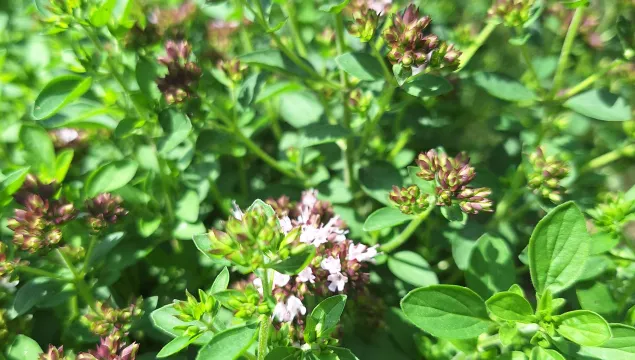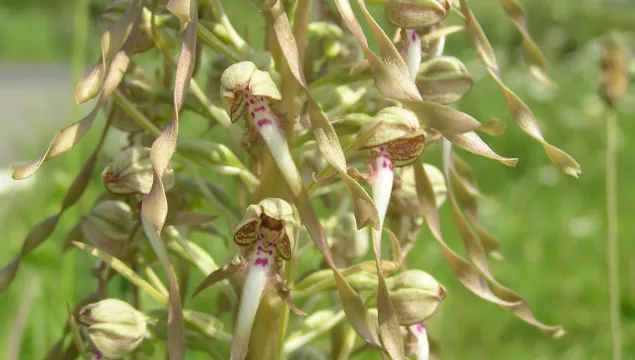Wild thyme
The delightful fragrance of wild thyme can punctuate a summer walk over a chalk grassland. It forms low-growing mats with dense clusters of purple-pink flowers.
The delightful fragrance of wild thyme can punctuate a summer walk over a chalk grassland. It forms low-growing mats with dense clusters of purple-pink flowers.
Water mint grows in damp places and has aromatic leaves that can be used to flavour food and drink. Gathering wild food can be fun, but it's best to do it with an expert - come to a Wildlife Trust event to try it.

Wild marjoram is actually the same aromatic herb as oregano which is used in Mediterranean cooking. Its small, pink flower clusters can be seen on chalk and limestone grasslands in summer.
The Common fragrant-orchid lives up to its name: it produces a sweet, orangey smell that is very strong in the evening. Look for its densely packed, pink flower spikes on chalk grasslands in summer.

The petals of the rare Lizard orchid's flowers form the head, legs and long tail of a lizard. They are greenish, with light pink spots and stripes, and smell strongly of goats! Spot this tall plant on chalk grasslands and dunes in the South East.
The common spotted-orchid is the easiest of all our orchids to see: sometimes, so many flowers appear together that they create a pale pink carpet in our woodlands, old quarries, dunes and marshes.
Look for the unusual flowers of lords-and-ladies in spring woodlands: a pale green sheath surrounds a spike of tiny, yellow flowers. This spike eventually forms a familiar, short stalk of striking red berries.
The vast, green mats that sometimes cover the surface of still water, such as ponds, flooded gravel pits and old canals, are actually Common duckweed. A tiny, single plant, it groups together to form 'lawns'.
As its name suggests, Red bartsia does have a red tinge to its stem, leaves and small flowers. Look for it on roadside verges, railway cuttings and waste ground in summer.
A fleshy herb of the wet margins of brooks, streams and ditches, Brooklime can be seen all year-round and provides shelter for tadpoles and sticklebacks.
A common thistle of roadside verges, rough grassland and waste ground, the Musk thistle has large, purple, nodding flower heads that appear in summer. It is attractive to a wide range of insects.
Look for the round, cottony, purple flower heads of the Woolly thistle on chalk and limestone grasslands in summer. It is mainly found in Southern England.